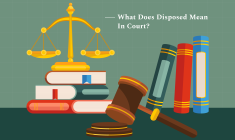If you face a car accident, you might have to deal with multiple legal requirements. However, it is easier said than done. This is because dealing with legal issues is extremely overwhelming. In fact, a good place to start is by familiarizing yourself with the necessary personal injury legal terms.
However, if you know anyone who has dealt with a situation like that, they will tell you that with the right knowledge, you will be able to turn your case around.
Apart from that, you will have to deal with the following situations:
- Negotiating with insurance agents
- Thinking about whether to sue or not
- Simply attempting to get your head around your rights, and more.
Hence, if you know some basic legal terms, you will be able to make better decisions regarding your case. Therefore, read on to know more about personal injury legal terms.
5 Important Personal Injury Legal Terms You Must Know
The following are some of the most important personal injury legal terms you must know:
1. Negligence
Primarily, negligence means that someone failed to take care when they should have in a particular circumstance. It is somewhat akin to the distinction between making an honest mistake and being truly reckless.
In the context of automobile accidents, negligence may manifest in activities like sending a text message while driving, running a red light, or driving under the influence.
Hence, to prove someone was negligent, you must prove four main things:
- The defendant had a duty to care for you.
- They messed up that duty.
- Their actions directly led to your injuries.
- You suffered actual damages because of it.
In general, all drivers must drive safely and follow the traffic laws. However, when someone breaks that rule and causes an accident, they are legally responsible for the damages.
Apart from that, negligence in car accidents is a serious issue. This is because it is not about whether or not someone intended to harm anyone. Rather, it means the person who was at fault for your accident doesn’t necessarily have to have bad intentions at all.
Also, it is about whether what they did is reasonable in the same situation. That’s why it’s important to get advice from a good lawyer.
When you’re dealing with complex negligence cases, reach out to a professional like the top auto accident attorney Harris Weinstein.
This team of legal professionals will help you decide if the other party’s actions legally qualify for negligence. Also, you will be able to develop a solid case to prove it.
2. Liability
Liability is merely the law’s polite way of saying who’s to blame in a case of injury. If a person is liable for your damages, they must pay you for what you have lost.
Although it sounds simple, it becomes really messy when there are multiple individuals. Also, there are problems when there is a dispute regarding what actually happened.
Apart from that, you must also know about your liability. In fact, it is not necessarily about who was wrong and made the accident happen. Rather, there is the potential for multiple individuals to be at fault.
Sometimes, even a car accident might have both parties at fault for what happened. However, you must establish the liability. In this case, you have to do the following:
- Utilize evidence like police reports, witness testimony, and photos from the accident scene.
- You must bring in expert witness statements.
Meanwhile, insurance companies and opposing counsel will sometimes attempt to deflect liability away from their clients. Hence, you must get good evidence. Therefore, take the help of an experienced legal counsel to counter that.
3. Damages
At the outset, damages are the money you receive for what you have lost because of someone else’s mistake. This is where things get serious in personal injury claims. This is because damages are what you get compensated for. Hence, it helps you recover from your injury and losses.
The following are the two types of damages you must be aware of:
a. Compensatory Damages
Essentially, they help you get back on your feet by paying for what you lost. In general, it includes economic damages like medical expenses, lost wages, and any damages done to your property.
Apart from that, it might also be non-economic damages. These are mainly pain, suffering, and emotional distress.
b. Economic Damages
Economic damages are the easy ones to calculate. This is because they are all about concrete numbers like hospital expenses and salaries.
However, non-economic damages are somewhat more complex. This is because they require a more subjective approach. In fact, you have to factor in the following things:
- The severity of your injuries.
- The impact of your injuries on your daily life.
- Your eventual recovery.
c. Punitive Damages
Primarily, punitive damages are rare, with a completely different function. Instead of awarding you what you have lost, punitive damages exist to punish the defendant. This is due to reckless or willful misconduct. This way, the law discourages others from behaving similarly.
4. Statute of Limitations
The statute of limitations is important for anyone who’s been in an accident. This is because it decides if you look for any kind of compensation.
Basically, this judicial principle puts a strict deadline on when you will be able to sue a person for a personal injury.
Meanwhile, if you miss the time, you will no longer be able to seek damages in court. In general, most states have one to six years for making a claim for personal injury.
Apart from that, the statute of limitations typically runs from the date of the accident. However, there are some important exceptions to this rule. Sometimes, if you don’t realize you are hurt immediately, the deadline will start from that time.
Essentially, the statute of limitations is an absolute time limit in most cases. In fact, courts will dismiss your suit even if you have a valid claim and ample proof.
5. Comparative Negligence
Primarily, comparative negligence is a legal doctrine applied where both persons involved in an accident share a degree of fault.
This doctrine is important because it significantly affects the level of compensation you may receive. This works even though you are mostly the victim of someone’s negligence.
In pure comparative negligence states, you will receive damages even if you’re 99% at fault. However, the court will cut your compensation proportionately. In addition to that, modified comparative negligence states do have a threshold.
Your Legal Guide: Be Aware of Your Rights
Obviously, accidents are stressful enough for a victim. However, it gets even more intimidating when you add all the convoluted legal jargon on top of that.
Meanwhile, if you are aware of the personal injury legal terms, you will be able to deal with insurance companies.
Apart from that, you will also make intelligent decisions about your case. Moreover, you must also reach out to an experienced attorney.
Read Also:
















